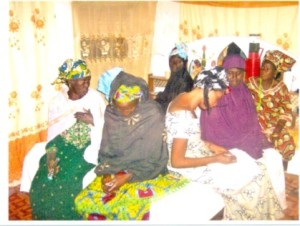 Oxfam’s Raising Her Voice (RHV) is a global programme with the aim of promoting the rights of women, especially those that are poor and/or marginalized. The Programme in the Gambia focused on the popularization, ratification, domestication and implementation of the Protocol to the African Charter on Human and Peoples’ Rights on the Rights of Women in Africa, commonly known as the Maputo Protocol. From 2008-2012, the African Centre for Democracy and Human Right Studies implemented this four year project with its partners in the Gender Action Team (GAT), a coalition of organizations and individuals from civil society and governmental departments working for gender equality in the Gambia.
Oxfam’s Raising Her Voice (RHV) is a global programme with the aim of promoting the rights of women, especially those that are poor and/or marginalized. The Programme in the Gambia focused on the popularization, ratification, domestication and implementation of the Protocol to the African Charter on Human and Peoples’ Rights on the Rights of Women in Africa, commonly known as the Maputo Protocol. From 2008-2012, the African Centre for Democracy and Human Right Studies implemented this four year project with its partners in the Gender Action Team (GAT), a coalition of organizations and individuals from civil society and governmental departments working for gender equality in the Gambia.The main purpose of the programme was to popularise and involve marginalised women on the contents of the regional Maputo Protocol and the national Women’s Act thereby empowering them to use it as an advocacy tool in the realization of their rights at the national level. Throughout the project, the need for capacity building and awareness raising on the human rights instruments, rule of law and other procedures and standards by law enforcement agencies and other stakeholders to better serve the society were emphasised. To address this need, many sensitization and capacity building activities were completed. Numerous workshops and trainings for individuals and women’s rights organisations were organised on the treatment of female detainees and officers, the harmful practices of FGM, reproductive rights, the utilising of women’s rights instruments, mobilizing resources and gender parity but to name a few.
Following the successful sensitization of women’s rights organizations by GAT across the country, ACDHRS and her partners embarked on a new strategic approach where grass root female leaders have formed Pressure Groups in the five regions with the aim of the effective implementation of the 2010 Women’s Act. These Pressure Groups work with Regional Governors, District Chiefs, Council of Elders, Religious leaders, National Assembly Members as well as Village heads to ensure the protection and promotion of all human rights and respect for women. Different strategies including educative media programmes and advocacy were used with the goal of eliminating all forms of discrimination, Gender Based Violence and injustices against women. In addition, National Gender Focal Persons were identified to ensure gender mainstreaming in their respective institutions and departments by the Gender Ministry Department.
In conclusion, the GAT through partnership, networking and capacity building impacted the lives of the poor and marginalised women. Site monitoring and evaluation were conducted to provide us with the first hand information on the project impact on the lives of the beneficiaries. From this interaction, the successes and the achievements were clearly highlighted with the success of the project being centralised on both the reformation in the legal framework and also the testimonies of those at the grassroots level. Women not only have grasped control of their rights but they are now also advocating and taking responsibility through the activities of the pressure groups and community meetings. Traditional communicators have developed songs and drama based on the provisions of the Protocol and the Act for easy understanding particularly as the majority of the population is illiterate. The Maputo Protocol and the Women’s Act have been translated into several of the local languages enhancing accessibility for rural women. In relation to the legal framework, the national government of the Gambia has already passed a law that commits all development players including the private sector companies to effectively implement and enforce all the provisions therein in the Women’s Act. Also, the adoption of the newly Gender and Women Empowerment Policy (2010 -2020) by both the Executive and the National Assembly is a prime example of how the efforts of the project have been realised on the ground. ACDHRS is proud in noticing that the rights of women in the Gambia are now an authority unto itself. The alliance between GAT and ACDHRS creates a new and improved environment for women rights and gender sensitive issues to breathe freely.

